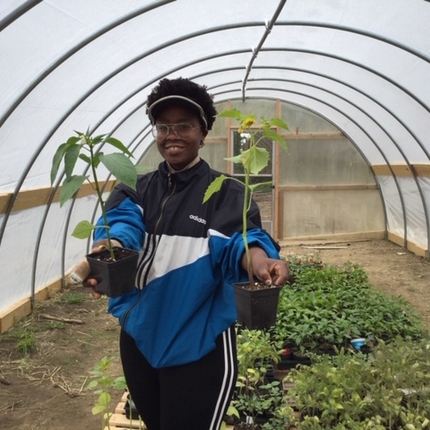Lucia Schulz contributed to this blog.
Though growing up in Lomé, the capital of Togo, West Africa, meant farm life was unfamiliar to Irene Atayi, it didn’t stop her from developing a love of growing plants.
As a child, she gained experience year by year while helping her mother in the garden by building beds, planting, and harvesting. After Irene got her own place, she started container gardening on her patio and also set up a hydroponic system indoors.
Irene’s lifelong love of gardening has led to a newfound desire to expand into agriculture. A chance meeting between the first generation farmer and Lucia Schulz, project assistant with the Center for Rural Affairs, has provided Irene with the opportunity to farm on her own this year, for the first time.
Irene first reached out to Lucia in hopes of finding farmland.
“We met at the Practical Farmers of Iowa annual conference, where she found out the Center might be able to help her,” said Lucia. “I sent her resources to educate her on how and when to make the right steps toward obtaining land.”
Currently farming on 1 acre, Irene grows a variety of vegetables including different kinds of peppers, tomatoes, eggplants, squash, potatoes, sweet potatoes, and strawberries, as well as herbs and flowers.
Irene and other like-minded aspiring farmers are actively working on building up their farms to provide produce for neighboring communities.
“Farming is both a business and a lifestyle change,” she said. “It starts with gaining the knowledge to be self-sufficient, and then can be turned into a business. My role in the community is important with food access being a worry because of the COVID-19 pandemic.”
Not only does Irene want to provide for her neighbors, she says tending to her crops has helped her deal with stress caused by the pandemic.
“I have been caring for my mental health by putting in a lot of work on my plot, developing beds, adding compost, and preparing for planting tomatoes after the last frost,” she said. “I have been finding time for myself every morning before the day starts. With the crisis and stay-at-home orders, I had a lot of time on our hands and accomplished many great projects.”
And, though Irene loves farming, it has not come without challenges.
“The hardest part for me at the beginning was having patience when waiting for germination, but I have learned to trust in the process,” she said. “I also believe access to land and knowledge about agriculture will help farmers of color succeed.”
Irene has also learned a few tricks on how to deal with weeds and pests. She uses wood chip mulch to cover weeds or plucks them from the ground. On her tomatoes, peppers, and eggplants, the farmer applies silver mulch, which helps increase yield, keeps insects away, and keeps soil warm. Spraying plants with a blend of a hot pepper and water is another method she’s incorporated as insect control. Pig’s blood is used to scare away animals that might try to eat her crops.
All of Irene’s efforts are paying off.
“When I saw Irene again about two weeks ago, I wasn't sure what to expect, but after visiting with her, Irene came across as very genuine and passionate about farming,” said Lucia. “She admits that it is hard work, but she loves it and that always impresses me.”
This work is funded by the U.S. Department of Agriculture’s Outreach Assistance to Socially-Disadvantaged Farmers and Ranchers Competitive Grants Program, otherwise known as the 2501 Program. All Center for Rural Affairs events and activities are open to the public on a nondiscriminatory basis.
To view other stories featuring USDA programs, explore our interactive map.





